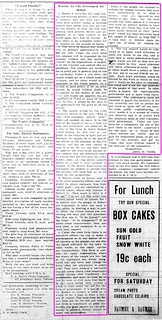In general I find this whole issue rather dull, but now and then some point of interest crops up. At the last town board meeting of October 1920, a number of men who had signed the original petition in favor of incorporation as a city now presented a new petition asking that their names be stricken from the first petition. Among them are some particular friends of ours, including C.C. Shearer, William Raschka, Paul Emery, Charles Lee, and Louis Buchfuehrer.

(Click on images to enlarge)
As you may gather from that report, Trustee John Thiel (a 42-year-old attorney) opposed anything that would stand in the way of Hobart's becoming a city. The same issue of the Gazette carried his argument in favor of the city form, hinting that under the current form there was a good deal of dubious stuff going on.

Sources:
♦ 1930 Census.
♦ "Petitions Are Out to Transform Hobart Into a City." Hobart News 10 July 1919.
♦ "Reasons for City Government for Hobart." Hobart Gazette 29 Oct. 1920.
♦ "Town Board Doings." Hobart Gazette 29 Oct. 1920.


No comments:
Post a Comment